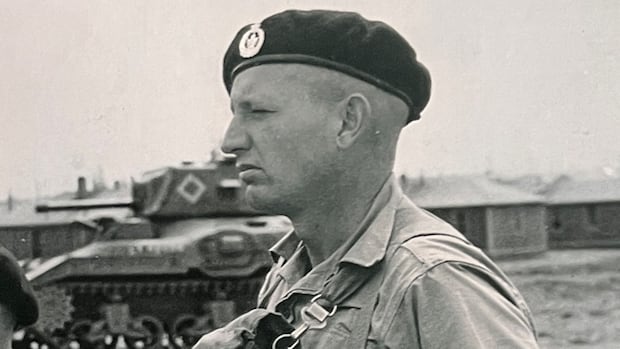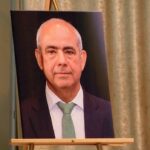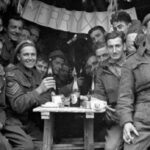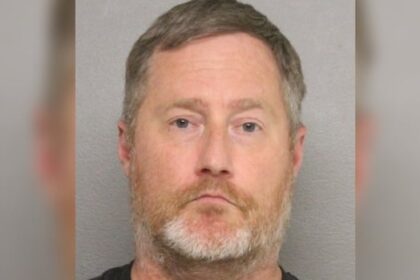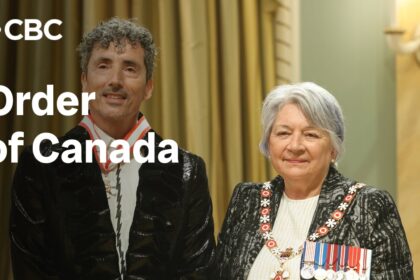In a cemetery in rural Norman, Okla., about 30 kilometres outside the state’s capital, a man some call a hero of the Canadian Army lies buried.But nothing about the grave of Millard (Tex) Allison — marked only by a simple plaque — hints at his actions recorded on the battlefields of Europe in the Second World War.Those actions led to Allison being nominated for the Victoria Cross, the highest military honour for a Canadian fighter.But the award was not granted to the dismay of Allison’s living family.“I feel as a veteran myself that veterans deserve more than they oftentimes get,” Allison’s daughter, Paula, who served in the U.S. Air Force, said in an interview with CBC News from her home in St. Joseph, Mo. “That’s why I was upset.”Photos and clippings of the life and service of Millard (Tex) Allison. In the foreground photo, Allison is centre-left, wearing a beret. He is speaking to Maj. Gen. Harry Letson, commander of the British Columbia Regiment at the time. (Michael Johnston for CBC)William Whalen, a historian for Allison’s old unit, the British Columbia Regiment, believes anyone who fought like Allison in the face of the enemy would have been awarded a Victoria Cross.Whalen and Allison’s family believe he was refused because of who he legally was: a deserter of the U.S. Army. “If he goes before the king, there’s going to be media and press and it’s probably going to come up pretty quickly that this person is missing from the United States Army,” Whalen explained of his impression of Canadian brass thinking, who sought “to avoid any embarrassing situations with our allies.”William Whalen, historian of the British Columbia Regiment, stands among exhibits at the regimental museum at the Beatty Street Drill Hall in Vancouver. (Ben Nelms/CBC)Allison joined the Canadian Army in 1941 as the U.S. had yet to enter the war.But despite fighting with Canada as part of the Allied effort, Allison was court martialed by the U.S. for desertion after the war. Veterans in Canada and the U.S. came to his defence but he still officially left American service with a general discharge under honourable conditions, not an honourable discharge.Allison died in 1976. His family is now appealing to authorities to upgrade his award to a Victoria Cross and grant him an honourable discharge from the U.S Army.Whalen displays a replica of the Victoria Cross medal. (Ben Nelms/CBC)“It’s just amazing what he did during the war,” said Allison’s grandson, Marc Bishop, himself a U.S. Army veteran.“I always felt kind of when I was in combat that he was my guardian angel. I wasn’t worried about dying because, I mean, if he could do what he did and make it back, I could go through what I had to go through.”Marc Bishop, a former U.S. Army artillery forward observer, holds a photo of his grandpa, Millard (Tex) Allison, in his Norman, Okla., home. (Michael Johnston for CBC)‘That’s the way my dad was’Allison was a sergeant in Fort Lewis, Wash., in the summer of 1941, according to his family.The U.S. was still officially neutral at the time and Allison read about the conflict in Europe with frustration.“That’s the way my dad was,” Paula Allison said. “He felt the world needed to resolve this issue and the United States was just sitting back and not doing anything, so he joined Canada to do it.”A Sherman tank — much like the type commanded by Allison at the Battle of the Küsten Canal — is parked outside the British Columbia Regiment’s Beatty Street drill hall in Vancouver. (Mike Zimmer/CBC)After crossing the border and enlisting in the Canadian Army, Allison was assigned to the British Columbia Regiment, a.k.a. the 28th Canadian Armoured Regiment. In April 1945, the unit crossed the Küsten Canal in western Germany.According to his Victoria Cross nomination, written by his commander, Lt.-Col. John Toogood, Allison’s tank drove over a railway bridge, drawing heavy fire. He couldn’t drive off the rails because his 30-tonne Sherman tank would sink into the soft, swampy ground.Instead, he used his tank to push a railway car along as cover.Tanks of the British Columbia Regiment in action in the Second World War. (Submitted by William Whalen)“The plan was completely successful,” the nomination read. “The enemy, being disturbed by the erratic progress of the car, turned all guns upon it. He was enabled to liquidate the enemy posts methodically as he advanced.”He pushed forward about two kilometres until German infantry charged at him with anti-tank weapons — too close for the tank’s weapons to shoot back. He popped out of his hatch, “exposed to the most merciless small arms fire,” and with a revolver and hand grenades, fought back the Germans. Whalen holds a piece of metal from a shattered Sherman tank. He explained part of the danger from a flaming tank was the vehicle, weighing 30 tonnes or more, could explode if the ammunition catches. (Ben Nelms/CBC)Then Allison saw that his commander’s tank, well behind him, had been hit and was in flames.“Without a moment’s hesitation, he scrambled out of his tank and worked his way back through the hellish automatic fire,” the nomination read.He grabbed his commander, Capt. Dave Bell, from the burning tank and ran him to cover.Then he rescued another survivor from the burning Sherman and ran him to safety as well. Allison then dashed back to his own tank, despite being burned badly, and for two days fought off repeated counterattacks. He was credited with destroying an armoured infantry vehicle and two self-propelled guns — tanks designed to destroy other tanks — as well as killing 50 enemy soldiers.“His initiative, devotion of duty, and absolute disregard for his personal safety was an inspiration to all,” the nomination read. “Largely owing to the stark courage of this single [non-commissioned officer], the … force maintained pressure and the enemy was compelled to regroup.”Allison was nominated for a Victoria Cross, but was not awarded one, instead receiving the Distinguished Conduct Medal.A replica of the Distinguished Conduct Medal. (Ben Nelms/CBC)A rare awardWhalen believes Allison’s technical desertion explains the Victoria Cross refusal, but admits that’s not formally spelled out in documents.“Very, very seldom you will see any written reason,” Whalen said. “[Generals] don’t want any kind of redress later on after the war.”The awarding of a Victoria Cross under any circumstances is incredibly rare. No Canadian has won one since 1945.Veterans Affairs Canada says about 100 Canadians have been awarded one, including 16 in the Second World War.It says 2,132 Canadians have been awarded a Distinguished Conduct Medal, including 162 in the Second World War. Marc Bishop looks at the grave where his grandfather and grandmother are buried in Norman, Okla. (Michael Johnston/for CBC)David O’Keefe, a professor of history at Marianopolis College in Westmount, Que., believes the deserter issue may have been a factor, but there could be other factors as well.Politics and pride between army units, he suggested, or the desire for some in the Canadian Army to discourage reckless behaviour from troops thought to be “medal-hunting.””What they’re a little bit worried about would be honouring somebody with the highest award for fear that somebody would try to emulate it later on, but in a reckless fashion,” O’Keefe said.But he agrees Allison’s actions are worthy of a Victoria Cross.Tex Allison with his family. He married Elizabeth Garner of Ontario during his time in the Canadian Army. (Submitted by Paula Allison)‘Canada would be lucky to get him’Allison and his Canadian wife and daughter — Bishop’s mother, born while Allison was overseas — left Canada after the war for a Fort Worth, Texas, trailer park where he worked in a factory.That’s where, in 1948, he was arrested by the FBI and charged with desertion. But helping defence in the court martial were his former comrades in Canada.An article in a Fort Worth newspaper covering Allison’s arrest and court martial. His trial and story were the subject of numerous articles in papers across Canada and the U.S. (Newspapers.com)Toogood, his old commander, lobbied American counterparts for Allison’s release, newspapers reported at the time, telling his lawyers about his war exploits.Veterans in Vancouver — including Capt. Bell, who Allison saved — filed a protest with the U.S. government, a Texas newspaper reported.“Maybe he’ll come back to us,” Bell was quoted as saying. “Canada would be lucky to get him.”Ultimately, the court martial convicted him of desertion in December 1948. Canadian and American veterans were vocal in advocating for Allison. His lawyer was a U.S. Congressman and Second World War veteran himself (Newspapers.com)He was sentenced to six months of hard labour — remitted, so he did not serve the time — and had his rank reduced from sergeant to private. He left the U.S. Army with a discharge under honourable conditions.“It’s a wonderful Christmas present,” the paper quoted Allison as saying.But Allison’s family feels he wasn’t treated properly.Bishop is appealing to a local congressman to get his grandfather an honourable discharge. He’s written to the Canadian government and even King Charles III to consider upgrading the Distinguished Conduct Medal.Although Allison was convicted and sentenced to hard labour, the remaining time was remitted and he did not have to serve it. (Newspapers.com)In Vancouver, Whalen says the regiment is fundraising to have a proper Canadian veteran headstone made for Allison’s grave in Oklahoma.“It’s a point of honour for us in the regiment,” Whalen said. “He deserves the recognition of that headstone but the downgrade of the V.C., well, that just puts an extra edge on it.”Allison’s story — an American coming north to Canada and then Canadians coming to his defence — could be an illustration of the close ties the two countries’ peoples have traditionally shared.The newfound strain on the relationship today is not lost on those who know Allison’s story.“We each share a border. If something happened to Canada tomorrow, wouldn’t I want the United States to defend them? If something happened to us, wouldn’t we want Canada to help defend us?” Paula Allison said.“So I’m telling you, we need as countries to resolve these issues that we are having right now, today.”
How an American deserter fought for Canada in WW II and Canadians fought for him
